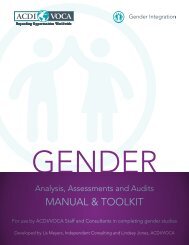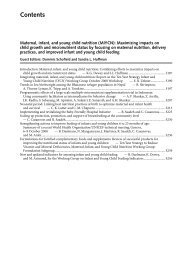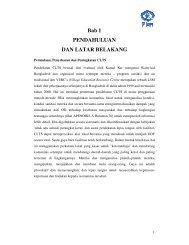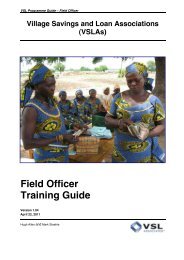Module 2. Theorethical Concepts of Gender - FSN Network Portal
Module 2. Theorethical Concepts of Gender - FSN Network Portal
Module 2. Theorethical Concepts of Gender - FSN Network Portal
You also want an ePaper? Increase the reach of your titles
YUMPU automatically turns print PDFs into web optimized ePapers that Google loves.
Mainstreaming <strong>Gender</strong> into Water, Sanitation and Hygiene (WASH) Programs<br />
<strong>Module</strong> 2: Theoretical <strong>Concepts</strong> <strong>of</strong> <strong>Gender</strong><br />
Lesson 5: Social and <strong>Gender</strong> Analysis<br />
Handout 5.<strong>2.</strong>3<br />
Insights into Patriarchy and <strong>Gender</strong> Stereotypes<br />
Definition <strong>of</strong> Patriarchy<br />
The word ‘patriarchy’ literally means the rule <strong>of</strong> the father or the ‘patriarch’.<br />
Originally, it was used to describe a specific type <strong>of</strong> ‘male-dominated family’ –<br />
a large household that included women, junior men, children, slaves and<br />
domestic servants all under the rule <strong>of</strong> one dominant man. Now it is used<br />
more generally to refer to male domination and the power relationships by<br />
which men dominate women. Patriarchy is a social system in which men and<br />
boys are considered superior, are valued more highly and have more rights<br />
and more control over resources and decision making than girls and women.<br />
In a patriarchal society, women are kept subordinate in a number <strong>of</strong> ways.<br />
Patriarchal structures have existed across time and in many different cultures.<br />
In Rwanda, words that describe this kind <strong>of</strong> social arrangement in<br />
Kinyarwandan are igisekuru and umutware wurugo.<br />
<strong>Gender</strong> Stereotypes<br />
<strong>Gender</strong> stereotypes are a set <strong>of</strong> characteristics that a particular group assigns<br />
to women or men (e.g. ‘domestic work is not a male responsibility’ or ‘women<br />
are passive’). <strong>Gender</strong> stereotypes are not always correct. They <strong>of</strong>ten do not<br />
reflect an individual's actual capacity or desires and usually limit what a<br />
person is permitted and expected to do by others in a society.<br />
Effects <strong>of</strong> Patriarchy and Stereotyping<br />
Patriarchy and gender stereotyping have had similar effects all over the world.<br />
Relational Inequality<br />
The subordination that is experienced by many women at a daily level,<br />
regardless <strong>of</strong> the class they might belong to, takes various forms, including<br />
discrimination, disregard, insult, control, exploitation and oppression. There is<br />
violence against women within the family, at the workplace and in society.<br />
Men with ‘feminine’ qualities are also discriminated against. Women and men,<br />
boys and girls who attempt to challenge stereotypes are <strong>of</strong>ten subject to<br />
forceful pressure to conform.<br />
Property and other Economic Resources<br />
Traditionally, there are two inheritance systems: patriarchal and matriarchal. In<br />
patriarchal systems, which are far more prevalent, men control most property<br />
and other productive resources which pass from one man to another, usually<br />
from father to son. Even where women have the legal rights to inherit assets,<br />
a whole array <strong>of</strong> customary practices, emotional pressures, social sanctions<br />
and sometimes violence prevent them from acquiring any actual control over<br />
these resources. In other cases, personal laws curtail their rights, rather than<br />
enhancing them. In most cases <strong>of</strong> inheritance <strong>of</strong> property and economic<br />
resources, women are disadvantaged.<br />
A Training Manual for Water Pr<strong>of</strong>essionals developed collaboratively by PROTOS and SNV, 01/02/2007<br />
<strong>2.</strong>13

















